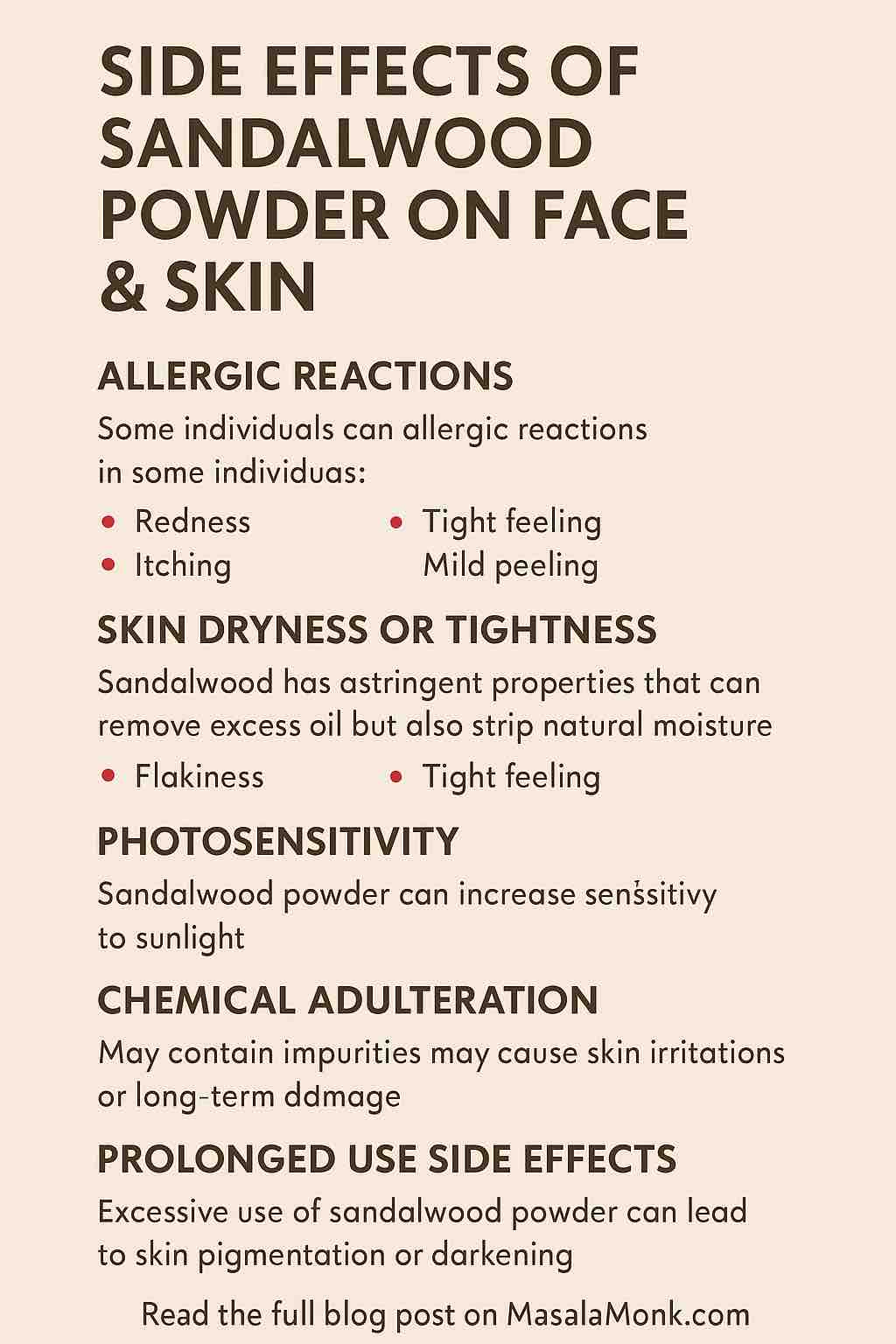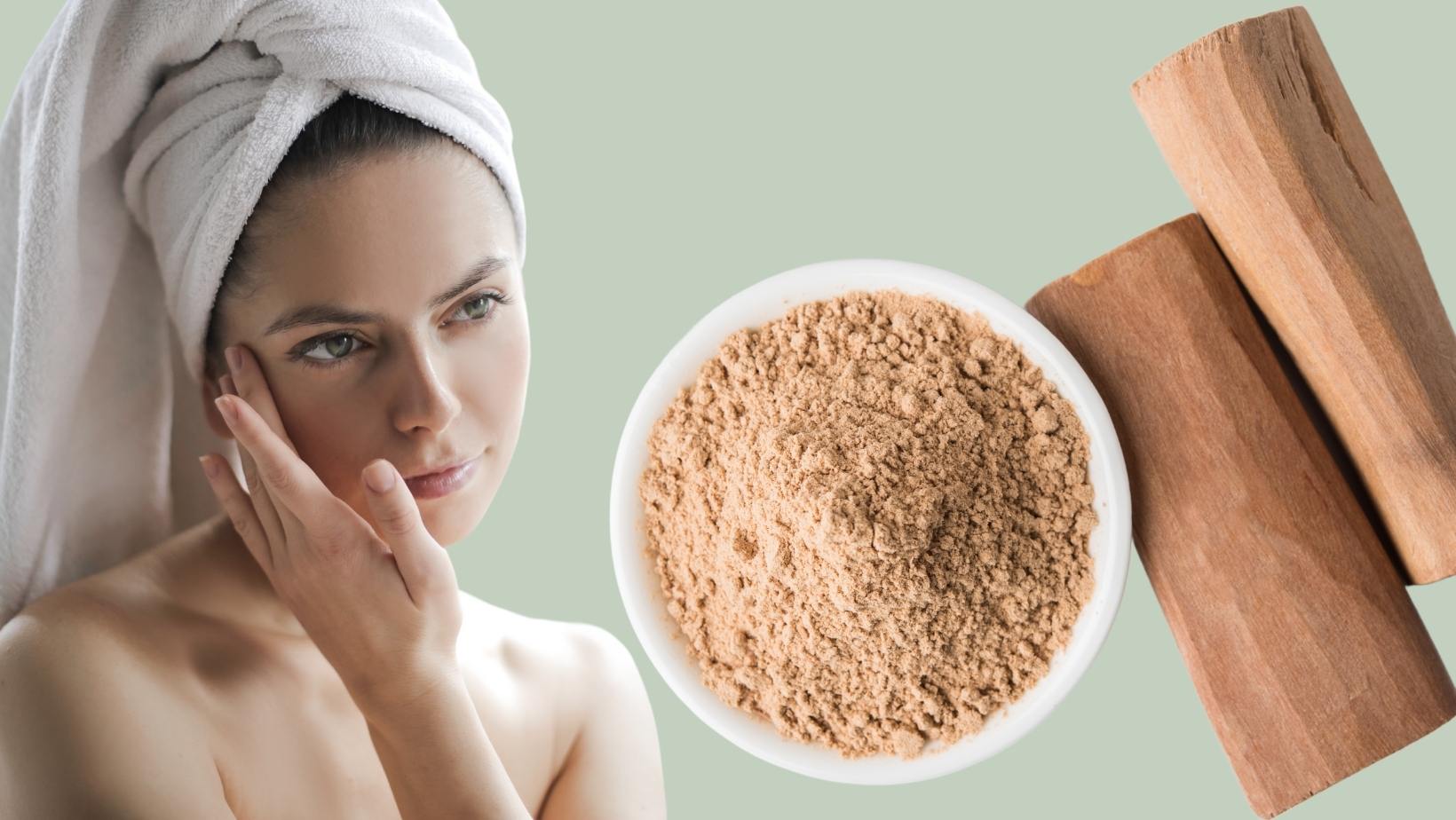
For centuries, sandalwood powder has been revered for its soothing aroma and impressive skin benefits. From ancient Ayurvedic practices to modern DIY beauty routines, this golden-hued powder is synonymous with glowing, blemish-free skin. But is it really all good news when it comes to applying sandalwood powder to your face?
While sandalwood is often praised for its anti-inflammatory, antimicrobial, and cooling properties, it is not entirely without drawbacks. In this post, we delve deep into the lesser-discussed side of sandalwood powder: its potential side effects. We’ll blend scientific insights with real user experiences to give you a comprehensive view so you can make informed choices.
1. Allergic Reactions: Not Everyone’s Skin Loves Sandalwood
Though considered gentle by many, sandalwood can trigger allergic reactions in sensitive individuals. These reactions are typically caused by components like santalol found in sandalwood oil, which is often present in the powder as well.
Scientific Evidence: A 2015 review in the journal Contact Dermatitis identified sandalwood oil as a potential allergen responsible for allergic contact dermatitis in certain individuals. Symptoms include redness, swelling, itching, and sometimes blistering.
User Insight: Reddit and beauty forums are filled with users detailing rashes and breakouts after using face packs containing sandalwood powder, especially when used without patch testing.
Tip: Always perform a patch test on a small skin area 24 hours before full application.
2. Skin Dryness and Tightness: A Double-Edged Sword for Oily Skin
Thanks to its astringent properties, sandalwood powder is particularly popular among those with oily or acne-prone skin. However, its oil-absorbing effects can be too strong, potentially leading to dryness and tightness.
Mechanism: Sandalwood helps control sebum but can strip away the skin’s natural moisture barrier if overused. This is especially problematic for people with combination or sensitive skin.
User Insight: Several beauty bloggers have noted that while sandalwood initially improved oil control, prolonged use led to flaky patches and dullness.
Tip: Mix sandalwood with hydrating ingredients like honey, aloe vera, or milk to offset dryness.
3. Photosensitivity: Sunlight’s Unexpected Friend
One of the lesser-known risks of sandalwood powder is its potential to increase photosensitivity.
Scientific Insight: A case study published in JAMA Dermatology reported photocontact dermatitis following exposure to sandalwood oil. Though rare, the potential for increased sun sensitivity cannot be overlooked.
User Insight: People using sandalwood during summer or before sun exposure have reported redness and sensitivity post-application.
Tip: Use sunscreen after applying sandalwood or avoid sun exposure for a few hours post-application.
4. Pigmentation Issues: The Irony of Glowing Skin
Prolonged or excessive use of sandalwood powder may lead to pigmentation changes—sometimes darkening instead of the promised brightening.
Scientific Insight: Though not widely documented in peer-reviewed journals, dermatologists acknowledge that irritation or inflammation from overuse can stimulate melanin production, causing hyperpigmentation.
User Insight: Some users with darker skin tones report patchy darkening after using sandalwood regularly, possibly due to subclinical irritation or sensitivity.
Tip: Use sandalwood no more than 2-3 times a week and always monitor your skin’s response.
5. Adulteration Risks: What Are You Really Putting on Your Face?
Pure sandalwood is expensive and rare. This opens the door to widespread adulteration with synthetic fillers and fragrances that can irritate the skin.
Scientific Insight: Studies, including one by the Indian Council of Medical Research, have warned about the increasing adulteration of herbal skincare products, including sandalwood powder.
User Insight: Users buying from unverified sources often report allergic reactions or ineffectiveness, likely due to impure or fake products.
Tip: Always buy sandalwood powder from trusted, certified sources. Check ingredient lists and look for purity certifications.
Final Thoughts: Sandalwood Is Great—But Know Its Limits
Sandalwood powder can be a wonderful addition to your skincare regimen, but like all natural remedies, it is not universally suitable. Its benefits are real, but so are its risks.
The key lies in informed use:
- Patch test every time.
- Don’t overuse.
- Hydrate and protect your skin.
- Buy pure, trusted products.
By understanding the full spectrum of effects—both good and bad—you’ll be in a better position to harness the power of sandalwood safely and effectively.
Have you experienced any side effects with sandalwood powder? Share your story in the comments below and help others make informed skincare decisions!
🔍 FAQs About Sandalwood Powder Side Effects
1. Can sandalwood powder cause skin irritation?
Yes. While it’s generally safe for many, some people may experience redness, itching, or rashes due to allergic reactions or sensitivity to natural compounds like santalol.
2. Is sandalwood powder safe for daily use?
Not recommended. Daily use can lead to over-drying or irritation. It’s best to use sandalwood powder 2–3 times a week, depending on your skin type.
3. How can I know if I’m allergic to sandalwood powder?
Perform a patch test by applying a small amount mixed with water to your inner arm. Wait 24 hours to check for signs of redness, itching, or swelling.
4. Can sandalwood powder darken my skin?
In rare cases, prolonged or excessive use—especially on sensitive or irritated skin—can lead to hyperpigmentation due to inflammation-triggered melanin production.
5. What should I mix with sandalwood powder to avoid dryness?
Pair it with hydrating ingredients like aloe vera gel, honey, milk, or rose water to balance its astringent effects.
6. Is sandalwood powder safe for sensitive skin?
It can be, but caution is advised. Always patch test, dilute it with soothing agents, and limit use to avoid triggering a reaction.
7. Can sandalwood powder cause sunburn or photosensitivity?
Yes, in some cases. It may increase sensitivity to sunlight. Use sunscreen and avoid sun exposure after application.
8. How do I choose pure sandalwood powder?
Look for products labeled “100% pure” or “organic,” ideally from brands with third-party certifications or transparent sourcing practices.
9. Can I use sandalwood powder during pregnancy?
Topical use in small amounts is generally considered safe, but due to the risk of sensitivity or allergic reactions, it’s best to consult your healthcare provider first.
10. What are the signs that I should stop using sandalwood powder?
If you experience redness, itching, burning, flakiness, or dark patches after use, discontinue immediately and consult a dermatologist.










